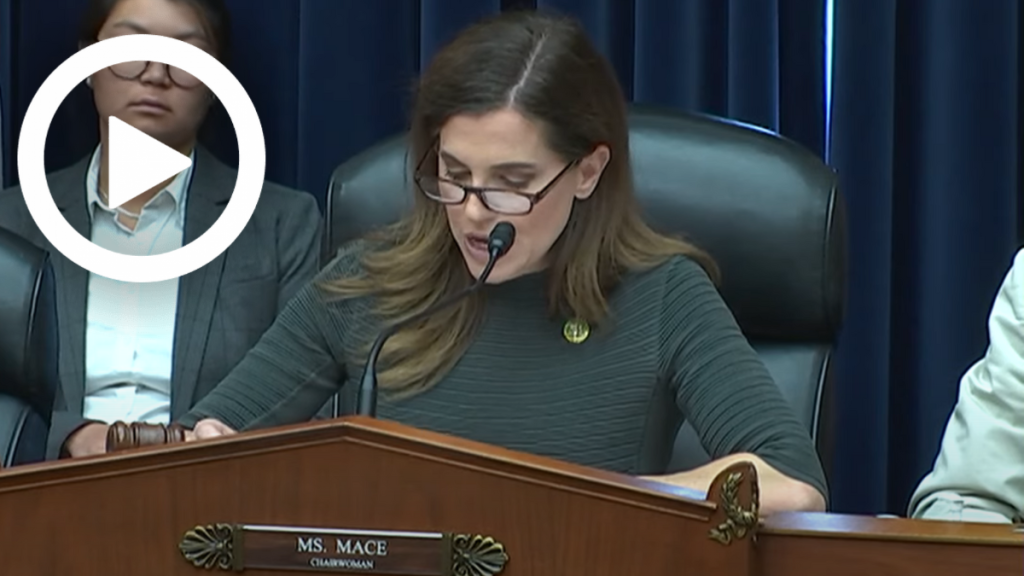Mace: Failure to Implement New Travel System Speaks to Widespread IT Acquisition Failure at DOD
WASHINGTON – Subcommittee on Cybersecurity, Information Technology, and
Government Innovation Chairwoman Nancy Mace (R-S.C.) delivered opening remarks at a hearing titled “Getting Nowhere: DoD’s Failure to Replace the Defense Travel System.” In her opening statement, Subcommittee Chairwoman Mace slammed the Department of Defense’s (DOD) failure to replace its decades old legacy travel system with a modern software-as-a-service solution, which wastes millions of dollars and keeps in place a system wrought with improper payments. Subcommittee Chairwoman Mace continued by calling out DOD Under Secretary for Personnel and Readiness Gil Cisneros, who was overseeing the move to the new travel system, for failing to appear before the subcommittee to provide answers to the American public. Subcommittee Chairwoman Mace closed by emphasizing that attempts to dodge accountability for wastes of taxpayer dollars is not acceptable.
Below are Subcommittee Chairwoman Mace’s remarks as prepared for delivery.
Good afternoon, and welcome to this hearing of the Subcommittee on Cybersecurity, Information Technology, and Government Innovation.
We are here today to get answers and accountability concerning the most recent IT acquisition failure at the Defense Department.
It’s not a major weapons system contract we’re talking about. This is a garden variety travel booking system upgrade. And that’s exactly what makes this failure so disturbing.
As DoD acquisition expert Bill Greenwalt of the American Enterprise Institute recently wrote:
“The department’s inability to bring online something as mundane as a workable tool for business travel doesn’t bode well for its other efforts at accessing commercial technology and providers for military solutions. In artificial intelligence, data analytics and a host of other areas, DOD is light years behind the commercial market…how can anyone expect the companies that make these technologies to do business with the Pentagon when it can’t even adopt a relatively simple software?”
After years of planning, DOD was up until a few months ago on course to finally replace its decades old legacy travel system with a modern software-as-a-service solution reflecting commercial best practices.
DOD’s travel-related expenses—which chiefly fund temporary duty travel for civilian and military personnel—amounted last year alone to $8 billion. But hundreds of millions of those dollars were wasted on improper payments. Additional dollars were wasted implementing manual workarounds the system requires. These are funds diverted every year from the agency’s warfighting mission.
The annual cash bleed and user frustration under the existing system is so bad that DOD used it to justify the issuance in 2021 of a non-competitive sole source contract for a replacement system. It was that important to exit their travel system as soon as possible.
Last October, DOD Under Secretary for Personnel and Readiness Gil Cisneros instructed all DOD components that they were to move to the new travel system—and that course was affirmed when the agency’s budget proposal was issued this past March.
But just two months later, that all changed.
In May, Under Secretary Cisneros issued a new memo that pulled the plug on the whole project and told all components to stick with or return to the old system.
Since then, in media comments and briefings with Committee staff, DOD has offered a variety of excuses for scrapping the effort to replace its archaic travel system. To put it politely, the excuses are lame. They don’t add up.
That’s why I invited Under Secretary Cisneros to personally come here today and tell us what went wrong.
Mr. Cisneros is not here, however. Why is that?
DOD never indicated Mr. Cisneros is unavailable. Instead, agency officials decided to put forward one of Mr. Cisneros’s subordinates—who they deemed better able to answer our questions.
It’s not clear how they arrived at that decision.
Last Thursday a joint subcommittee hearing was held in this room, concerning DOD’s failed financial audit. One of the witnesses was John Tenaglia, who is the senior procurement executive at DOD who approved the sole-sourcing of the new travel system contract.
I asked Mr. Tenaglia who was responsible for the recent cancellation of that contract. And he said—you can check the tape—he said, “that’s under the purview of the Under Secretary for Personnel and Readiness.”
That’s Mr. Cisneros. That’s who we invited to testify here today. But DOD didn’t send the accountable official. They sent his subordinate.
That sounds to me like an attempt to dodge accountability.
I think I speak for all the members of this Subcommittee—on both sides of the aisle—when I say that it’s not going to work. Not here. Not today.
So Mr. Register, for your sake, I don’t want to hear you say today that you can’t answer any questions, because they are above your pay grade.
With that, I yield to the Ranking Member of the Subcommittee, Mr. Connolly.
